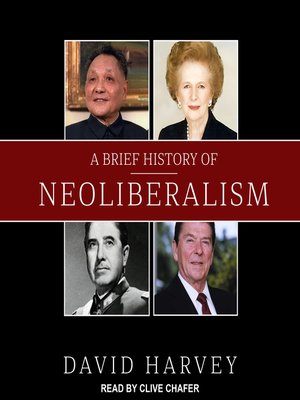[Update: In the comments, “gunker” explains that this is another of Scott’s reader-contributed book reviews, not one of his own work. My apologies for the mistake.] After a quick rundown of the conventional explanation for the decline and fall of the comfortable post-WW2 US economy in the 1970s, Scott gives an overall appreciation of Harvey’s arguments:
… This treatment is almost the opposite of the way ABHoN describes events. Telling the story this way makes me feel like Jacques Derrida deconstructing some text to undermine the author and prove that they were arguing against themselves all along.
Harvey is an extreme conflict theorist. The story he wants to tell is the story of bad people destroying the paradise of embedded liberalism in order to line their own pockets and crush their opponents. At his best, he treats this as a thesis to be defended: embedded liberalism switched to neoliberalism not primarily because of sound economic policy, but because rich people forced the switch to “reassert class power”. At his worst, he forgets to argue the point, feeling it so deeply in his bones that it’s hard for him to believe anyone could really disagree. When he’s like this, he doesn’t analyze any of the economics too deeply; sure, rich people said something something economics, to justify their plot to immiserate the working classes, but we don’t believe them and we’re under no obligation to tease apart exactly what economic stuff they were talking about.
In these parts, ABHoN‘s modus operandi is to give a vague summary of what happened, then overload it with emotional language. Nobody in ABHoN ever cuts a budget, they savagely slash the budget, or cruelly decimate the budget, or otherwise [dramatic adverb] [dramatic verb] it. Nobody is ever against neoliberal reform — they bravely stand up to neoliberal reform, or valiantly resist neoliberal reform, or whatever. Nobody ever “makes” money, they “extract” it. So you read a superficial narrative of some historical event, with all the adverbs changed to more dramatic adverbs, and then a not-very-convincing discussion of why this was all about re-establishing plutocratic power at the end of it. This is basically an entire literary genre by now, and ABHoN fits squarely within it.
Harvey’s theses, framed uncharitably, are:
1. Embedded liberalism was great and completely sustainable. The global economic system collapsing in 1971 was probably just coincidence or something, and has no relevance to any debate about the relative merit of different economic paradigms.
2. Sure, some people say that the endless recession/stagflation/unemployment/bankruptcy/strikes of the 1970s were bad, but those people are would-be plutocrats trying to seize power and destroy the working class.
3. When cities, countries, etc, ran huge deficits and then couldn’t pay any of the money back, sometimes the banks that loaned them that money were against this. Sometimes they even asked those places to stop running huge deficits as a precondition for getting bailed out. This proves that bankers were plotting against the public and trying to form a dystopian plutocracy.
4. Since we have proven that neoliberalism is a sham with no advantages, we should switch back to embedded liberalism.
Let’s go through these one by one and see whether I’m being unfair.





Small correction. This is not by Scott himself, but rather a guest review that is part of a book review “competition” he is running.
Comment by gunker — May 7, 2021 @ 06:33
Thanks for the correction. Usually, for his reader reviews, he prefixes the title of the post with “Your Book Review”, and this one omitted the “Your” so I assumed it was Scott himself rather than one of his numerous and erudite readership.
Comment by Nicholas — May 7, 2021 @ 08:34